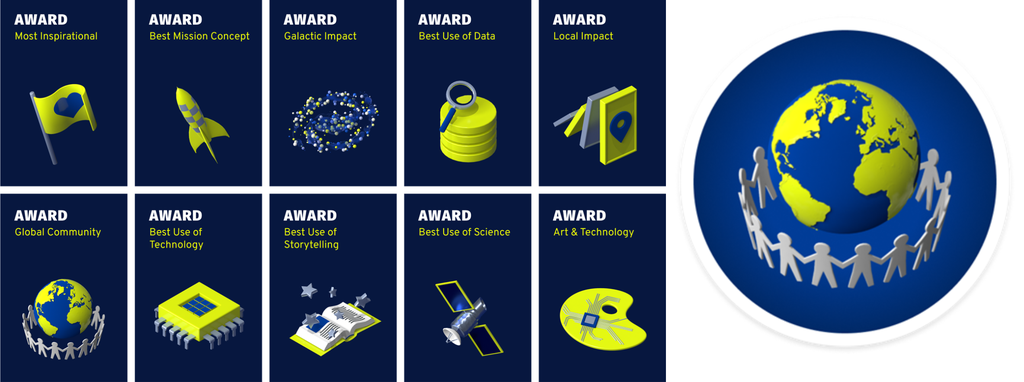
More than 90,000 people from all over the world participated in the latest edition of the Space App Challenge. This annual two-day event, organized by the US space agency, NASA, is an opportunity to innovate and learn about the advantages that open space data can offer.
This year the competition will be held on October 4 and 5. Through a hackathon, participants will engage first-hand with NASA's most relevant missions and research. It's an opportunity to learn how to launch and lead projects through hands-on use of NASA data in the real world. In addition, it is a free activity open to anyone (those under 18 years of age must be accompanied by a legal guardian).
In this post, we tell you some of the keys you need to know about this global benchmark event.
Where is it held?
Under the banner of the Space Apps Challenge, virtual and face-to-face events take place all over the world. Specifically, in Spain, meetings are held in several cities:
- Barcelona
- Where: in person, at 42 Barcelona (Carrer D'Albert Einstein 11).
- Madrid
- Where: face-to-face, at the School of Digital Competences – San Blas Digital (Calle Amposta, 34).
- Murcia
- Where: in person at UCAM HITECH (Av. Andrés Hernandez Ros, 1, Guadalupe).
- Malaga
- Where: Face-to-face, at a location to be determined (you can contact the event organizer through the link).
- Pamplona
- Where: face-to-face and virtual, in a location to be determined (you can contact the event organization through the link)
- San Vicente del Raspeig (Alicante)
- Where: in person, at the Alicante Science Park (University of Alicante, San Vicente del Raspeig).
- Seville
- Where: Face-to-face, at a location yet to be determined (you can contact the event organizer via the link).
- Valencia
- Where: in person, at the UPV Student House, Polytechnic University of Valencia (Camino de Vera, s/n Building 4K).
- Zaragoza
- Where: in person, at the Betancourt Building, Río Ebro Campus (EINA) Calle María de Luna, 1.
All of them will have a welcome ceremony on Friday, October 3 at 5:30 p.m . in which the details of the competition will be presented, the teams and the themes of each challenge will be organized.
To participate in any of the events, you can register individually and the organization will help you find a team. You can also register your team directly (of a maximum of 6 people).
If you can't find any in-person events near you, you can sign up for the universal event that will be online.
Are there any prizes?
Yes! Each event will award its own prizes. In addition, NASA recognizes, each year, ten global awards divided into different categories:
-
Best Use of Science Award: recognizes the project that makes the most valid and outstanding use of science and/or the scientific method.
-
Best Data Use Award: awarded to the project that makes spatial data more accessible or uses it in a unique way.
-
Best Use of Technology Award: distinguishes the project that represents the most innovative use of technology.
-
Galactic Impact Award: awarded to the project with the greatest potential to improve life on Earth or in the universe.
-
Best Mission Concept Award: recognizes the project with the most plausible concept and design.
-
Most Inspiring Award: It is awarded to the project that manages to move and inspire the public.
-
Best Narrative Award: Highlights the project that most creatively communicates the potential of open data through the art of storytelling.
-
Global Connection Award: awarded to the project that best connects people around the world through technology.
-
Art and Technology Award: recognizes the project that most effectively combines technical and creative skills.
- Local Impact Award: awarded to the project that demonstrates the greatest potential to generate impact at the local level.

Figure 1. Space App Challenge Awards. Source: https://www.spaceappschallenge.org/brand/
From Gijón to the world: the Spanish project awarded in 2024
In last year's edition, a Spanish project, specifically from Gijón, won the global award for best mission concept with its Landsat Connect application proposal. The AsturExplorer team developed a web application designed to provide a fast, simple and intuitive way to track the path of Landsat satellites and access surface reflectance data. Their project fostered interdisciplinary and scientific learning capacities, and empowered citizens.
The Landsat program consists of a series of Earth observation satellite missions, jointly managed by NASA and the U.S. Geological Survey (USGS), providing images and data about our planet since 1972.
End users of the app developed by AsturExplorer can set a destination location and receive notifications in advance to know when the Landsat satellite will pass over each area. This allows users to prepare and take their own measurements on the ground and obtain pixel data without the need to constantly monitor satellite schedules.
The AsturExplorer team used open Landsat data from NASA and Earth Explorer. They also made use of artificial intelligence to understand the technical problem and compare multiple alternatives. You can read more about this use case here.
How do I register?
The Space App Challenge website offers a section of frequently asked questions and a video tutorial to facilitate registration. The process is simple:
- Create an account
- Register for the Hackathon
- Choose a local event
- Join a team and form your own
- Submit a project (before 11.59am on 5 October)
- Complete the Engagement Survey
We encourage you to be part of this global benchmark event where you will reuse open datasets. A great opportunity!


